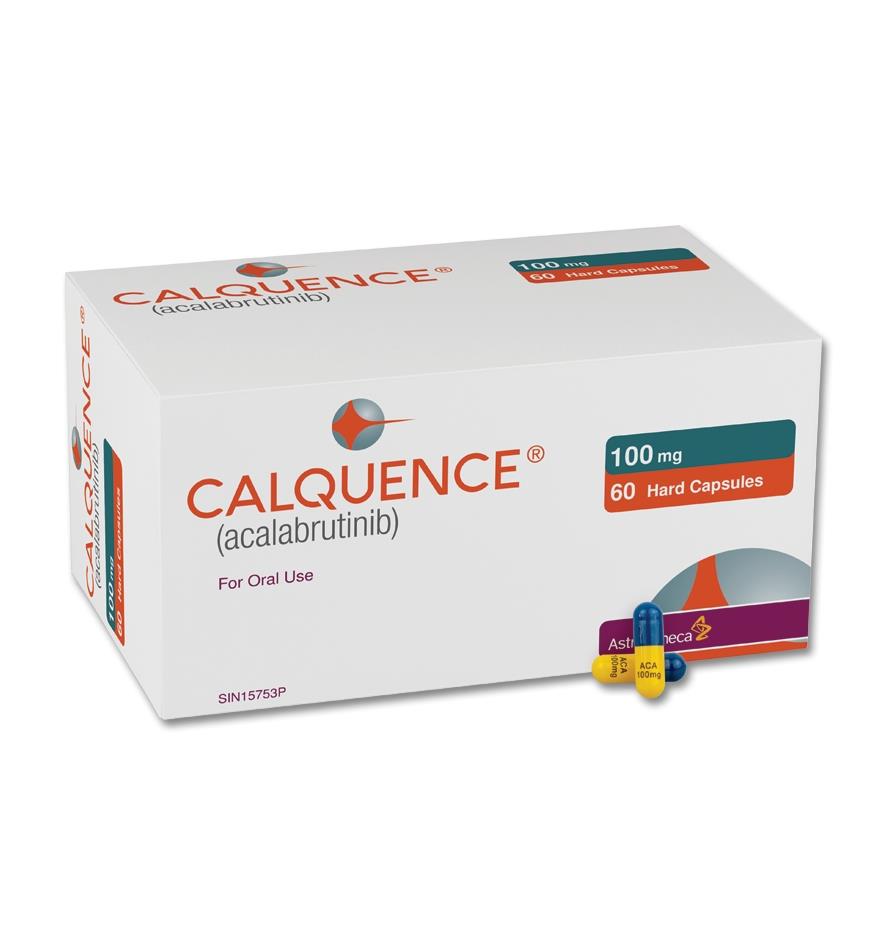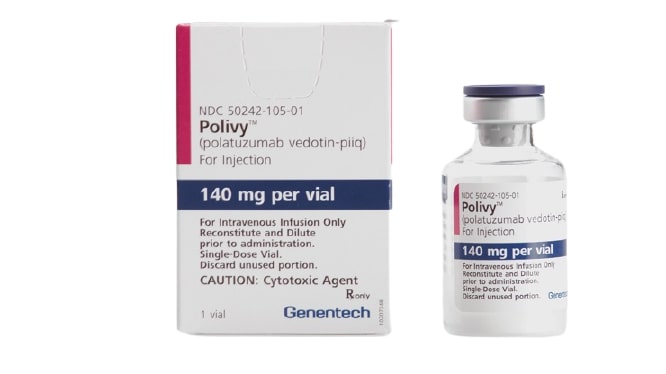Calquence (acalabrutinib) vs Polivy (polatuzumab vedotin-piiq)
Calquence (acalabrutinib) vs Polivy (polatuzumab vedotin-piiq)
Calquence (acalabrutinib) is a Bruton's tyrosine kinase (BTK) inhibitor primarily used in the treatment of certain types of B-cell malignancies, such as chronic lymphocytic leukemia (CLL) and mantle cell lymphoma (MCL). Polivy (polatuzumab vedotin-piiq), on the other hand, is an antibody-drug conjugate targeted against CD79b, used in combination with other drugs for the treatment of relapsed or refractory diffuse large B-cell lymphoma (DLBCL). The choice between Calquence and Polivy would depend on the specific type and stage of lymphoma being treated, as well as the patient's overall health, previous treatments, and potential side effects, and should be made in consultation with a healthcare professional specialized in oncology.
Difference between Calquence and Polivy
| Metric | Calquence (acalabrutinib) | Polivy (polatuzumab vedotin-piiq) |
|---|---|---|
| Generic name | Acalabrutinib | Polatuzumab vedotin-piiq |
| Indications | Treatment of mantle cell lymphoma, chronic lymphocytic leukemia, and small lymphocytic lymphoma | Treatment of diffuse large B-cell lymphoma |
| Mechanism of action | Bruton's tyrosine kinase (BTK) inhibitor | Anti-CD79b antibody-drug conjugate |
| Brand names | Calquence | Polivy |
| Administrative route | Oral | Intravenous |
| Side effects | Headache, diarrhea, muscle pain, anemia, infection | Neutropenia, thrombocytopenia, anemia, peripheral neuropathy, fatigue |
| Contraindications | Hypersensitivity to acalabrutinib or its excipients | Hypersensitivity to polatuzumab vedotin-piiq, its excipients, or murine proteins |
| Drug class | Small molecule kinase inhibitor | Antibody-drug conjugate |
| Manufacturer | AstraZeneca | Genentech, Inc. |
Efficacy
Efficacy of Calquence (Acalabrutinib) in Treating Lymphoma
Calquence (acalabrutinib) is a novel medication that has shown efficacy in the treatment of certain types of lymphoma, particularly in mantle cell lymphoma (MCL), which is a rare and aggressive form of non-Hodgkin lymphoma. Acalabrutinib is a Bruton tyrosine kinase (BTK) inhibitor that blocks BTK signaling, which is essential for the growth and survival of malignant B cells. Clinical trials have demonstrated that acalabrutinib produces a high response rate in patients with relapsed or refractory MCL. The medication has been granted accelerated approval by the U.S. Food and Drug Administration (FDA) for this indication based on overall response rate, although continued approval may be contingent upon verification and description of clinical benefit in confirmatory trials.
For patients with MCL, acalabrutinib has been shown to be effective both as a monotherapy and in combination with other treatments. Studies have reported that acalabrutinib monotherapy resulted in a significant improvement in progression-free survival compared to alternative standard therapies. The safety profile of acalabrutinib has also been characterized as manageable, with fewer instances of severe bleeding and atrial fibrillation compared to other BTK inhibitors.
Efficacy of Polivy (Polatuzumab Vedotin-piiq) in Treating Lymphoma
Polivy (polatuzumab vedotin-piiq) represents another advancement in the treatment of lymphoma, specifically for diffuse large B-cell lymphoma (DLBCL), which is the most common form of non-Hodgkin lymphoma. Polatuzumab vedotin is an antibody-drug conjugate that targets CD79b, a protein expressed on the surface of B cells, and delivers a potent cytotoxic agent directly to the cancer cells. The FDA granted accelerated approval for Polivy in combination with bendamustine plus rituximab (BR) for the treatment of adult patients with relapsed or refractory DLBCL, not otherwise specified, after at least two prior therapies. This approval was based on the results of a pivotal phase II study that showed a significant improvement in complete response rates and overall survival when Polivy was added to BR, compared to BR alone.
The use of Polivy in clinical practice has been associated with improved outcomes in a patient population with very limited treatment options. However, as with many cancer therapies, the benefits of Polivy must be weighed against its potential side effects, and its use is generally reserved for patients who have not responded to or have relapsed after other available treatments. Continued approval for this indication may depend on the verification of clinical benefit in further confirmatory trials.
Regulatory Agency Approvals
Calquence
-
European Medical Agency (EMA), European Union

-
Food and Drug Administration (FDA), USA

-
Health Canada

-
Pharmaceuticals and Medical Devices Agency (PMDA), Japan

-
Therapeutic Goods Administration (TGA), Australia

Polivy
-
Food and Drug Administration (FDA), USA

-
Pharmaceuticals and Medical Devices Agency (PMDA), Japan

-
Therapeutic Goods Administration (TGA), Australia

Access Calquence or Polivy today
If Calquence or Polivy are not approved or available in your country (e.g. due to supply issues), you can access them via Everyone.org.
How it works

Make an enquiry
Choose the medicine you want to buy, answer a couple of questions, and upload your prescription to speed things up. We’ll get back to you within 24 hours.


Make an enquiry
Choose the medicine you want to buy, answer a couple of questions, and upload your prescription to speed things up. We’ll get back to you within 24 hours.


Breeze through the paperwork
We'll guide you through the required documents for importing unapproved medicine, ensuring you have all the necessary information.


Get a personalized quote
We’ll prepare a quote for you, including medicine costs and any shipping, administrative, or import fees that may apply.


Receive your medicine
Accept the quote and we’ll handle the rest - sourcing and safely delivering your medicine.

Some text on this page has been automatically generated. Speak to your physician before you start a new treatment or medication.
Let's talk
If you have any questions, call us or send us a message through WhatsApp or email:
Contact us




